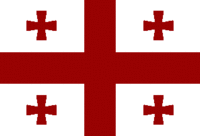Georgia

| |
| National motto: ძალა ერთობაშია (Dzala Ertobashia) ("Strength in Unity") | |
| President: | TBD |
| Prime Minister: | TBD alsof |
| Languages: | |
| Official: | Georgian |
| Others: | Abkhaz, Armenian, Aramaic, Azari Persian, Greek, Ossetian, Parra, Russian, Urum Tatar |
| Cities: | |
| Capital: | Tbilisi (2.2 million) |
| Other: | Kutaisi (235,000), Rustavi (160,000), Batumi (136,000), Suhumi (120,000), Artvin (25,711) |
| Area: | 69,700 km² |
| Population: | 6,983,032 (2020 estimate)/6,650,506 (2019) Georgians |
| Independence: | from Russia |
| Date: | 1918 |
| Currency: | 1 Georgian Maneti (₽)=kapeiki |
| Organizations: | League of Mediterranean and Pontic Peoples |
The Republic of Georgia is a country on the Black Sea in the South Caucasus. It shares borders with the Russian Federation in the north, Armenia in the south, and Azerbaijan in the east.
History
Georgian history dates back more than 2,500 years, and Georgian is one of the oldest living languages in the world. Tbilisi, located in a picturesque valley divided by the Mtkvari River, is more than 1,500 years old. Much of Georgia's territory was besieged by its Persian and Turkish neighbors along with Arabs and Mongols over the course of the 7th to the 18th centuries. After 11 centuries of mixed fortunes of various Georgian kingdoms, including a golden age from the 11th to 13th centuries, Georgia was forcibly absorbed into the Russian Empire in 1801, its people suppressed by the state.
However, pockets of Georgian resistance to foreign rule continued, and a renewed Kingdom of Georgia was established on May 26, 1918, after the collapse of Tsarist Russia. Both the Bolshevik Red Army and the tsarist White Army made efforts to reoccupy the country, but as they only mutually each other mutually, Georgia managed to remain independent.
During the Second Great War, Georgia was briefly occupied by Russia. At the end of the hostilities, Russia withdrew, leaving behind desolation and a pro-snorist regime. The king was murdered by treacherous generals, and because the new leader declared the old house "debased and unfit to rule", his wife and only surviving son became refugees, moving from one sympathetic country to the next and finally ending up in Australasia. A SNORist republic lead by a general loyal to Moscow governed the people for nine years, from 1945 to 1954. The media was routinely controlled, government funds were misappropriated, and a campaign of Georgianization was initiated which lasted until 1993.
Despite all the SNORist regimes being overthrown by 1990, Georgia's remained for a few years. Demonstrations against the state kicked off in March 1993 after Zurab Kantavis, a senator, stormed the Senate building with several thousand supporters. Snap elections were called and Kantavis was elected the first President of Georgia on September 6, 1993. The other main leader of the revolution was elected as prime minister. Kantavis ended his seven-year term in 2000 and handed over power to the current President Egias Sakartuli. During his term, the first-ever female prime minister of the country was elected. The previously faltering economy rose, corruption was stamped out, and for the first time, citizens could vote. The death penalty was abolished in 1995, and a proper constitution was established in 1994.
The Georgian Government is committed to economic reform and stakes much of its future on the revival of the ancient Silk Road as the Eurasian corridor, using Georgia's geography as a bridge for transit of goods between Europe and Asia.
This effort has been undermined by secessionist forces in the regions of Abkhazia, Adjara and South Ossetia. Dissidents in Abkhazia, Adjaria and Ossetia have all agitated for freedom from central rule in Tblisi, and it is somewhat infectious in the region as there have been recent ruminations of independence among the populations of North Ossetia-Alania and Chechnya. Ingushetiya, between the two regions has remained staunchly pro-Moscow. -->
Population
6,983,032 in 2020. 6,893,032-475,544-293,288-219,966-146,644-118,712-117,286-48,882-42,596-35,614-34,916-31,108-29,328-28,630-18,214-9,776-6,984-4,808-4,190-2,222-968
Ethnic Groups
- Georgians (includes all Kartvelian-speakers such as Mingrelians, Adjarans, Laz, etc.) (76.01%): 5,313,356
- Armenians (6.81%): 475,544
- Scythians (Alans, Ossetes) (4.2%): 293,288
- Russians, Czechs, Belarusians, & Bulgarians (3.15%): 219,966
- Doukhobor Russians: 17,428
- Subbotniks (religiously Jewish): 3,046
- Czechs: 2,794
- Bulgarians: 2,698
- Belarusians: 562
- Abkhaz (2.1%): 146,644
- Pontians/Rûm (includes Tatar-speaking Urums) (1.7%): 118,712
- Persians and Azeris (1.6%): 117,286
- Ukrainians (.7%): 48,882
- Assyrians (.61%): 42,596
- Kurds (.51%): 35,614
- Levantines (.5%): 34,916
- Nakh peoples (Kists, Bats, Chechens) (.45%): 31,108
- Kists: 11,444
- Chechens: 10,852
- Bats: 8,812
- Caucasus Germans (.42%): 29,328
- Jews (.41%): 28,630
- Veneds (.26%): 18,214
- Italians (Ligurians) (.14%): 9,776
- Udis (Caucasian Albanians) (.1%): 6,984
- Gypsies (Lom, Dom, and Rom people) (.07%): 4,808
- Russian Roma 2,566
- Armenian Lom 2,022
- Kordi Dom: 220
- Afrikaners/Boers (South Africans) (.06%): 4,190
- Avars (.03%): 2,222
- Turks (Meskhetians, Tatars, etc) (.01%): 968
Boer Migration and the New Batavia Movement
Religions
- Christian (%):
- Eastern Orthodox (%):
- Oriental Orthodox (6.13%): 427,990
- Catholic (1.73%): 120,492
- Latin Rite (58.5%): 70,488+8,590= 79,078
- Armenian Rite (41.5%): 50,004-8,590= 41,414 (8,590 Armenians worship in the Latin rite but the holy see has mandated that all Armenians in Georgia are part of the Armenian Catholic Church, even if they worship according to the Latin rite)
- Protestant (.31%): 21,756
- Assyrian Kirk (.05%): 3,396 (all refugees from Iraq)
- Spiritualists (Doukhobors) (.25%): 17,428
- Muslim (%):
- Sunni (% of Muslims):
- Shia (% of Muslims):
- Jewish (.45%): 31,676
- Georgian:
- Ashkenazi:
- Subbotnik: 3,046
- Zoroastrian (%):
- Not religious & other (1.2%): 83,796
- Yazidi (.3%): 20,842